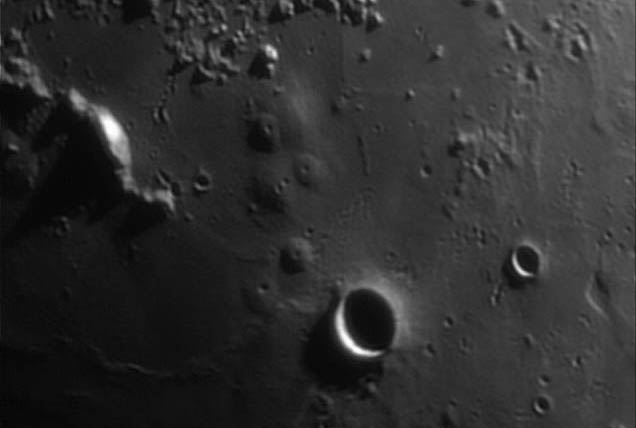New Light On A Familiar Domefield

Explanation:
This is the best mage of the Hortensius domes I have ever seen. It shows the domes and surrounding area so well that a new description is warranted. Dome 1 (see note below) is a perfect example of a hemispherical dome with a centered summit pit and well-defined edge where it meets the surrounding mare. Dome 2 looks roughly hemispherical, but is deformed where it nudges against Dome 6. Dome 3 is similar to #1 but is lower and flatter – it is more of a pancake and less hemispherical. Dome 4 is different from the first three. It is very flat and may be gently sloped downward to the north. It’s pit is off-center and looks deeper and larger than the previous dome pits; I am not certain if it is a volcanic pit or a random impact. Dome 5 has a lozenge shape and also slopes downward to the north. The left pit appears to have a raised rim (it casts a faint shadow) and the right pit is far off-center - are both these pits actually impact craters? Dome 6 is the opposite extreme of #1. Dome 6 is low, slightly irregular in outline, has lower slopes, feathers into the mare, and lacks a central pit – I would call it a swell. Other, much less well-defined domes and swells are hinted at in this image, but take a look at the other features here too. North-east of dome 6 is a strange straight ridge that looks like a mound over a burrowing animal. A hint of a second straight low ridge runs perpendicular to the bottom of the first one, and another, less straight ridge is to the east of dome 3. These are not artifacts (either in the processing or on the Moon!), but are peculiar structures. Note also the lozenge-shaped depression on the lower right side of the image – such a rimless irregular depression is probably a collapse pit of some sort. Finally, notice the slightly elongated crater at the upper right – it continues southward as two nearly parallel ridges. Is this a chain of small secondary impact craters, some of which have been covered by a thin veneer of lava? Lets not let an obsession with domes lead us to overlook other clues to lunar processes!
—
Chuck Wood
Technical Details:
18 Feb, 2005. 18" Starmaster dob + Atik B&W webcam + a 5X's Powermate barlow (11000mm fl) + a Schular 780 nm IR passband filter. The shot is a stack of 350 frames (out of 1200) done in Registax 2 and processed with Images Plus SW.
Note: Unfortunately, I (CAW) do not have access to a map that that shows the traditional numbering of these domes so my labeling scheme is non-standard – I am sorry for any nomenclatural confusion!
Related Links:
Rukl Plate 30
